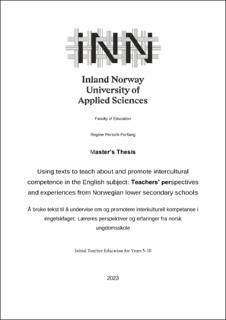Using texts to teach about and promote intercultural competence in the English subject: Teachers’ perspectives and experiences from Norwegian lower secondary schools
Master thesis
Permanent lenke
https://hdl.handle.net/11250/3079786Utgivelsesdato
2023Metadata
Vis full innførselSamlinger
Sammendrag
I denne masteroppgaven er interkulturell kompetanse forstått som kombinasjonen av kunnskap, ferdigheter og holdninger som er essensielle komponenter innenfor interkulturell kompetanse og nødvendige for elever å utvikle for å kunne lykkes med passende og respektfulle interkulturelle interaksjoner (Byram, 2021; Deardorff, 2006; Sercu 2005). Denne oppgaven utforsker engelsklærere i Norsk ungdomsskoles oppfatninger av å bruke ulike typer tekster til å undervise om og utvikle deres elevers interkulturelle kompetanse. Metoden brukt til å samle data i oppgaven var semi-strukturert intervju, og funnene er diskutert i forhold til relevant teori (f.eks., Byram, 2021; Lund, 2020; Liddicoat & Scarino, 2013), tidligere forskning (f.eks., Lyngstad, 2019, Cornei & Dina, 2014; Heggernes, 2021) og Læreplan I Engelsk (Utdanningsdirektoratet, 2020).
Resultatene i oppgaven indikerer at lærernes forståelse av begrepet interculturell kompetanse er i trå med det som er skrevet i Læreplan i Engelsk (Utdanningsdirektoratet, 2020). Lærerne uttrykte at de vurderer ulike egenskaper, slik som toleranse og forståelse av andre, som viktige for interkulturell kompetanse. De fremhevet også evnen til å kritisk evaluere egen kultur og viljen til å endre sitt eget perspektiv som essensielt. Likevel, antyder funnene at lærerne underviser kunnskap eksplisitt, mens de underviser ferdigheter og holdninger implisitt. Funnene tyder på at lærerne bruker en rekke ulike typer tekster i sin interkulturelle undervisning, inkludert lærebøker og autentiske tekster, som romaner, filmer og bildebøker. Funnene viser videre at lærerne anser den autentiske teksten som et nyttig verktøy til å forsøke å utvikle ulike komponenter av elevenes interkulturelle kompetanse. In this master’s thesis intercultural competence is understood as the combination of knowledge, skills and attitudes that are essential components of intercultural competence and necessary for pupils to develop to be able to succeed with appropriate and respectful intercultural interactions (Byram, 2021; Deardorff, 2006; Sercu 2005). This thesis explores teachers of English in Norwegian lower secondary schools’ perceptions on using different types of texts to teach about and promote their pupils’ intercultural competence. The method used to gather data for this thesis was the semi-structured interview, and the findings are discussed in relation to relevant theory (e.g., Byram, 2021; Lund, 2020; Liddicoat & Scarino, 2013), previous research (e.g., Lyngstad, 2019, Cornei & Dina, 2014; Heggernes, 2021) and the English subject curriculum (The Norwegian Directorate for Education and Training, 2020).
The results in this thesis imply that the teachers understanding of the term intercultural competence is in accordance with what is written in the English subject curriculum (The Norwegian Directorate for Education and Training, 2020). The teachers express that they consider different aspect, such as tolerance and understanding of others to be important to intercultural competence. They also emphasize the ability to critically evaluate one’s own culture and the willingness to change one’s perspective as essential. Even so, the data imply that the teachers work with the component of knowledge explicitly, while teaching skills and attitudes implicitly. The data suggest that the teachers use a variety of different types of texts in their intercultural teaching, including textbooks and authentic texts, such as novels, films and picture books. The data show further that the teachers consider the authentic text to be a useful tool, when trying to develop different components of their pupils’ intercultural competence.
